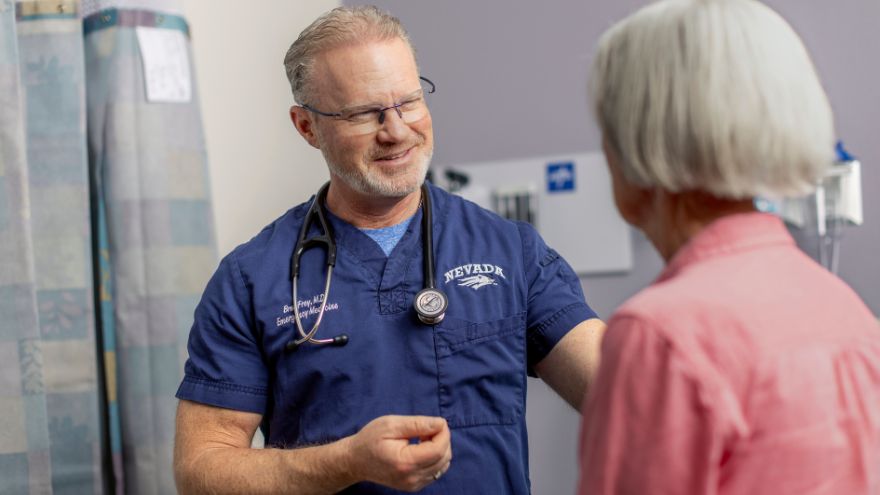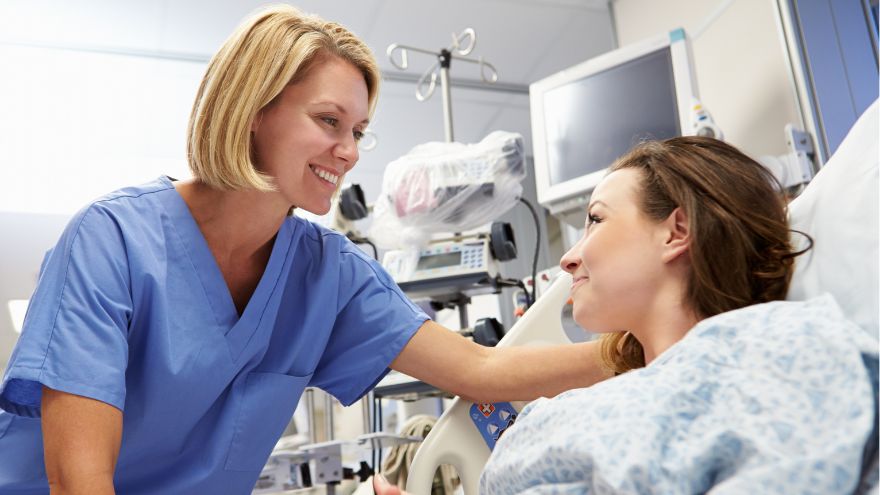Buscar
-
Healthy Potato Salad A Creamy Dreamy and Light Picnic Favorite
Potato salad is the superstar of summer picnics, a delightful sidekick at backyard BBQs, and a tasty everyday treat! Our friends at Renown's Health Improvement Programs whipped up a fabulous, health-conscious version that doesn't skimp on the creamy dreaminess we crave. This salad features purple potatoes for a dash of delightful color. It's also easy to make, with protein-rich Greek yogurt and egg whites. This simple but classic dish will indeed become your circle's new favorite—talk about a tasty transformation!
Read More About Healthy Potato Salad A Creamy Dreamy and Light Picnic Favorite
-
Know when to visit an ER: Top 5 concerns
When a sudden illness or injury occurs, the emergency room (ER) provides immediate medical attention to those in need. Understanding the top reasons for visiting the ER can help people make informed decisions about seeking emergency care. Here are the five most common reasons people in Nevada visited an ER in 2023. 1. Abdominal pain One of the top reasons people visit the ER is abdominal pain. The abdomen has many organs, including the stomach, liver, small and large intestines, gallbladder and pancreas. Significant pain in this area can be a cause of concern. Warning signs of a serious problem include abdominal pain with fever, vomiting, and not being able to move or perform everyday tasks due to pain. Seeking medical attention when experiencing these symptoms is essential. Emergency physicians can perform abdominal exams, assess the condition and rule out significant threats. 2. Fever High fevers that do not get better with medicine and are accompanied by other symptoms can cause concern. This can indicate that the body is fighting off an infection or illness. Fever with symptoms like vomiting, pain, altered mental status, shortness of breath or inability to perform daily functions are warning signs to watch out for. Adults and children should visit an ER, where the team can assess the causes of the fever. 3. Chest pain and shortness of breath Chest pain and discomfort, or pain in the upper body can suggest warning signs of a heart attack. If a person is experiencing signs of a heart attack, call 911 immediately to ensure timely treatment or assessment by a medical professional. Heart attack symptoms include: Chest pain, including pain that can be described as chest pressure, heaviness or squeezing Discomfort in the chest, arms, back, neck, shoulders and jaw Difficulty breathing Sweating with any of the above symptoms When visiting a Renown ER for chest pain, a trained medical professional will promptly perform an Electrocardiogram (EKG) in an area where preliminary assessments, also known as triage, take place. Individuals experiencing shortness of breath or trouble breathing, whether from a respiratory infection, asthma complications or other pre-existing conditions should not ignore symptoms as these can signify more serious issues. Warning signs of respiratory distress may include: A significant change in breathing rate A significant change in the amount of energy used to inhale or exhale when breathing Changing of the skin color to blue, gray or paleness, which can indicate a lack of oxygen Nasal flaring Chest retractions, which can suggest difficulty bringing air into the lungs What this looks like: the chest sinking in just below the neck, breastbone or rib cage while breathing 4. Neurological symptoms Sudden and severe headaches or seizures may prompt individuals to visit the ER if symptoms are extremely disorientating or debilitating. These symptoms could be indicative of various conditions, including strokes or neurological disorders that require prompt evaluation. If a person is experiencing signs of stroke, call 911 immediately to ensure timely treatment. Stroke symptoms include: Numbness, weakness or loss of movement in the face, leg or arm, especially on one side Confusion, including trouble speaking or understanding Trouble with vision or loss of balance When choosing emergency care for signs and symptoms of stroke, a Comprehensive Stroke Center can provide patients with immediate intervention, including evaluation, treatment and education. 5. Cough/flu-like symptoms Emergency departments are staffed by medical professionals trained to prioritize and treat emergency and trauma situations. Receiving care at an ER should be reserved for severe symptoms and life-threatening conditions. It’s best to schedule a visit with a primary care physician for mild cold and flu symptoms. Most urgent care locations are equipped with rapid testing options, including RSV, COVID-19, influenza, mononucleosis, urinary issues and strep throat. It is critical to distinguish between common respiratory infections and more severe cases, such as pneumonia or complications from the flu. Symptoms that may warrant a visit to the ER include: Rapid decline in the ability to perform regular daily activities Coughing or throwing up blood Severe dehydration and inability to drink fluids High fever not responsive to medication Understanding top ER visits in Nevada While these ER complaints are common reasons for emergency room visits in Nevada, it's important to remember that emergency care is available for all immediate medical needs. Do not hesitate to seek help at an emergency room if someone experiences a sudden or severe health concern. Quick and appropriate action can make a significant difference in keeping you and your loved ones healthy. Renown Health is the largest locally governed, not-for-profit healthcare network in northern Nevada, providing leading emergency and trauma care by board-certified emergency physicians 24/7 at three locations, including the region’s only pediatric emergency department. Renown Health emergency rooms prioritize swift assessments, advanced diagnostic tools and compassionate care, providing leading emergency and trauma care. Trust Renown ER for not just emergency care but exceptional care. Learn more at renown.org/ER.
-
Most Common Reasons Women Visit the ER
If you or someone you know is experiencing a medical emergency, it's essential to seek immediate attention by calling 9-1-1 or visiting the ER for a thorough evaluation by a trained medical professional and timely intervention. Access to a convenient and trusted emergency room (ER) is critical to any person’s healthcare needs, including medical emergencies related to women’s health. We explored some common scenarios and warning signs prompting women to seek immediate medical attention with Aiden Gould, Board-Certified Emergency Physician at Renown Health. When your medical emergency can’t wait, Renown ER is here to provide you with the region’s leading emergency care to diagnose and treat your condition or illness. Understanding Common Reasons Women Visit the Emergency Room Gynecological Emergencies: One of the most common reasons women may seek emergency care is due to gynecological emergencies such as severe pelvic pain, abnormal bleeding or complications related to pregnancy. These issues can be alarming and warrant immediate medical attention if the issue persists or is out of the ordinary for you. Emotional and Physical Well-Being: For those facing diverse medical or mental health emergencies, seeking prompt assistance is crucial for a thorough assessment and safe, timely intervention. Renown ER teams are equipped with trained professionals who provide compassionate care for individuals seeking help in the following situations: Suicide risk assessment and intervention Substance abuse assessment Assault and trauma care Crisis support and intervention Resources for ongoing care and well-being support Severe Abdominal Pain: Unexplained and severe abdominal pain that is substantially different than what is normal for you is a symptom you should never ignore as it can indicate underlying issues. Warning signs of an acute medical situation include fever, vomiting or a rapid change in motor function and inability to move due to pain. Respiratory Distress: Difficulty breathing, persistent coughing and other respiratory issues can be especially concerning. Women with pre-existing respiratory conditions like asthma or those experiencing sudden respiratory distress should seek immediate care from a medical professional. Warning signs of respiratory distress may include a significant change in one’s breathing rate, changing of the skin color to blue, gray or paleness due to lack of oxygen, nose flaring and chest retractions. Cardiovascular Emergencies: Heart-related issues are not exclusive to men. Women can also experience cardiovascular emergencies that often go undiagnosed because symptoms differ from men. Symptoms like chest pain, extreme fatigue, vomiting or pain in the abdomen, shortness of breath or palpitations should be evaluated by an emergency medical professional as timely intervention is critical in such cases. Renown leads the region in cardiology care with our technological expertise and patient-centered approach. Our comprehensive team diagnoses heart disease and other cardiac conditions, offering personalized treatment plans. Neurological Symptoms: Sudden and severe headaches, seizures or other neurological symptoms may prompt women to visit the ER if symptoms are extremely disorientating or debilitating. These symptoms could be indicative of various conditions from mild to severe, including strokes or neurological disorders that require prompt evaluation. Renown Regional Medical Center is a Comprehensive Stroke Center, providing primary stroke care including evaluation, treatment and education to patients who arrive at a Renown facility with the signs and symptoms of a stroke. Compassionate Care in Times of Need At Renown Health, we understand that your time is valuable, especially in emergency situations. That's why we strive to provide patients with exceptional care, compassion and respect. Plan ahead and make informed decisions about seeking medical care by viewing your estimated triage wait time at a Renown ER.
-
What to Expect at a Renown Health ER
Access to a trusted and efficient emergency room (ER) in times of unexpected medical emergencies is crucial. Renown Health’s emergency and trauma care is available at three ER locations, including the region’s only level II trauma center and ER designed for pediatric patients to provide you and your family with prompt, high-quality and specialized care by board-certified emergency physicians when you need it. Dr. John Hardwick, board-certified emergency physician at Renown Health, describes a guide to emergency care at Renown Health below. Timely and Compassionate Care: Renown ER is committed to delivering timely and compassionate care. Experienced medical professionals at Renown will communicate openly with you, involving you in the decision-making process and addressing any concerns you may have. Upon arrival, you can expect to be promptly assessed by a team of skilled medical professionals who will prioritize your needs based on the severity of your illness or condition. Click here to learn more about the emergency care process, from check-in to discharge. Expert Medical Team: With advanced technology and experienced specialists from Northern Nevada Emergency Physicians, all patients are in good hands for emergency care at Renown Health. Our pediatric and adult emergency physicians have completed fellowship training in specialty areas such as sports medicine, ultrasound and emergency medical services. Team members in the emergency department will ensure you are informed and as comfortable as possible during your visit to minimize any pain or discomfort you may feel. Efficient Triage Process: Renown ER utilizes an efficient triage process to prioritize patients based on the urgency of their medical condition. This ensures that those with more critical conditions receive immediate attention, while still providing timely care for others. Tests such as labs or diagnostic services will often be completed while you wait to see a physician to expedite the process. Comprehensive Diagnostic Services: The ERs at Renown offer comprehensive diagnostic services to quickly identify your symptoms. This may include X-rays, laboratory tests, CT scans and other imaging studies, helping emergency physicians make informed decisions about your treatment plan. Specialty Care and Collaboration with the Renown Health Network: We offer the area's largest network of specialized providers and services to help ensure you receive industry-leading, personalized care during and after your emergency room visit. This collaboration means you’ll have access to more specialists and a wide range of expertise to continue your care without leaving the Renown Health network. State-of-the-Art Facilities: Renown Health invests in state-of-the-art facilities and equipment to ensure that patients receive the best possible care. Renown ERs are equipped with modern medical technology, allowing board-certified emergency physicians to diagnose and treat a wide range of medical conditions. Post-ER Visit Support and Resources: Your experience with Renown Health doesn't end when you leave the ER. Our team will address your questions and provide you with post-visit instructions, medications and follow-up recommendations to continue your care. With a commitment to timely and compassionate care and a team of expert healthcare professionals, you can trust Renown ER to provide the highest standard of emergency medical services when you need it most.
-
Perfect Peanut Butter and Pumpkin Puppy Treats
This holiday season, sprinkle some extra joy for your favorite furry pals by whipping up these easy, AKC-approved dog treats. With simple ingredients and quick baking times, they're the perfect last-minute surprise to show your pet some love. Turn it into a delightful gift by snagging some adorable, budget-friendly canisters (easily found at dollar or thrift stores) and fill them to the brim with these homemade goodies. It's a merry, tail-wagging gift that's sure to make this season the most pet-friendly one yet! 🎄🐾🍪
Read More About Perfect Peanut Butter and Pumpkin Puppy Treats
-
Cranberry-Jalapeño Cream Cheese Dip
Add a dash of holiday cheer to your gatherings with this vibrant Cranberry-Jalapeño Cream Cheese Dip. Its festive red and green hues perfectly capture the spirit of the season, while the delightful blend of sweet, spicy, tart, and creamy flavors is sure to delight and tantalize your guests' palates. Simple to prepare, this appetizer is an irresistible addition to any holiday feast!
-
Mysterious Mummy Hot Dogs
This easy, kid-friendly recipe just might be the perfect pre-trick-or-treating meal that will vanish before your eyes! Serve with veggie sticks and mustard and ketchup for dipping. Several healthy hot dog options, such as vegan, turkey and chicken, are available in most grocery or health food stores.
-
3 Ways to Foster the Wellbeing of LGBTQIA+ Kids and Teens
Ensuring a healthier and more inclusive future for LGBTQIA+ children and teens is of utmost importance to health systems in our community, especially Renown. Supporting the physical and mental health of youth in this community is key to those efforts, especially as they face unique challenges in terms of identity acceptance and social integration. Dr. Caroline Barangan, Adolescent Medicine Physician with Renown Children’s Pediatric Specialty Care, discusses what you as a parent, caregiver, friend or support system can do to be a safe space for children and teens who identify as LGBTQIA+. 1. Create a Safe Space at Home The most important action you can take for your LGBTQIA+ teen or child is to accept and support them for who they are, regardless of how they identify. “Being a teenager is already difficult enough, especially within the LGBTQIA+ community, which puts them at risk of being stigmatized, rejected and targets for bullying,” said Dr. Barangan. Your supportive words and actions can make a huge difference as a profound expression of love and understanding. Being patient and willing to learn are the foundations to a healthy and loving relationship with your LGBTQIA+ teen or child. 2. Encourage Regular Check-Ups with a Primary Care Provider (PCP) Establishing your child or teen with a PCP is not only important when an illness occurs but also for annual preventative visits and regular check-ups. “A primary care provider can screen for high-risk behaviors that would put a patient’s health in jeopardy, such as sexual experience, substance use, suicidality and self-harm,” said. Dr Barangan. “These screenings are an opportunity to provide the education and support these kids and teens need to stay healthy.” One of the main concerns LGBTQIA+ youth often have is that they will experience judgment from their provider, or the PCP will disclose sensitive information, including their sexuality or gender identity to their parents, when they are not ready to do so. Dr. Barangan emphatically reminds us that this legally cannot happen. “If a patient asks me to keep something confidential, unless they disclose that they have plans to harm themselves or others, I am legally not allowed to share that information with anyone without their permission,” said Dr. Barangan. 3. Locate Local Resources Northern Nevada is home to a variety of resources for the LGBTQIA+ community at large, including youth members of this community. "Finding resources to help them develop in a positive way and provide them with the information they need, whether it be in school, the household, the community or through a medical or mental health provider, is incredibly important,” said Dr. Barangan. Below is a list of local LGBTQIA+ community resources open to you and your children: Our Center LGBTQIA+ Health Services at Northern Nevada HOPES Northern Nevada Pride Festival & Community Parade (happens every July in Reno) Sassabration (happens every September in Carson City) Lake Tahoe Pride (events and resources shared on Facebook)
Read More About 3 Ways to Foster the Wellbeing of LGBTQIA+ Kids and Teens
-
Head Injuries, Sprains and Broken Bones
Participating in sports and physical activities is enjoyable and beneficial for our health. However, the risk of injuries comes with the fun and excitement of sports. Sports-related injuries, including sprains, traumatic brain injuries and broken bones, are more common than we realize and can land you in the emergency room. Dr. Scott Shepherd, Emergency Medicine Physician, provides a wealth of information. Traumatic Brain Injuries: The Invisible Threat Traumatic brain injuries come in many forms. From “mild” brain injuries, concussions, to major brain injuries and bleeds. Sometimes it is very difficult to tell the difference between a major injury and a minor injury because many of the symptoms are the same. Concussions Concussions are a type of “mild” traumatic brain injury resulting from a blow to the head or a violent shaking of the body that causes a transient alteration in mental function. They are particularly prevalent in contact sports such as football, soccer and boxing. A concussion can affect memory, judgment, reflexes, speech, balance and muscle coordination. Typically, concussions are not life threatening and usually short lived. However, multiple concussions can lead to permanent disabilities. So, remember there is nothing “mild” about injuring your brain. Contusions The more serious brain injuries from brain contusions (actual bleeding in the brain material) and bleeding that presses on the brain are life threatening. These injuries are caused by the same blow to the head as a concussion and the symptoms are the same from memory deficits, loss of coordination to coma. Because of this, anyone who has a blow to the head and is not acting normal should be evaluated by a medical professional. Anyone suspected of having a severe head injury should seek immediate medical attention and follow a strict protocol for rest and a gradual return to play. It is important to note a person may not lose consciousness if they suffer a concussion; however, major consequences can occur if not properly managed. If you suspect you have an emergency that needs immediate medical attention, please call 911 or visit an emergency room near you. While it is impossible to prevent traumatic brain injuries altogether, the severity of the injury can be mitigated through proper helmet usage and knowing your skill level when participating in high-risk activities. The guidelines for picking a helmet for summer activities such as mountain biking, dirt biking and riding off highway vehicles are similar to those of picking a helmet for winter sports. Learn more about choosing the right helmet. Any blow to your head, neck or upper body can result in a major head injury Signs to watch for include the following: Headache Dizziness Blurred vision Difficulty with thinking, attention or memory Sensitivity to noise or light Ringing in the ears Changes in hearing Double vision Changes in behavior Balance issues Nausea/vomiting Sprains: The Annoying Twist One of the most common sports injuries is a sprain, which occurs when ligaments that connect bones are stretched or torn. Sprains typically occur in joints, such as the ankle, knee or wrist, and are often caused by sudden twists or impacts. Symptoms may include: Pain Swelling Bruising Limited range of motion Rest, ice, compression and elevation (RICE) are the initial recommended treatment, followed by physical therapy to regain strength and mobility.
-
Nurturing Your Child's Back-to-School Mental Health
The back-to-school season is here, and ensuring your child's successful transition involves more than just school supplies and schedules. At Renown Children’s Hospital, and in collaboration with Nevada Pediatric Psychiatry Solutions, we understand the vital role that mental health plays in a child's overall well-being and academic performance. Below we'll guide you through essential tips for a smooth back-to-school experience, with a special focus on nurturing your child's mental health. How to Support Your Child’s Mental Health from Home Remember, the below strategies can be adapted to align with your child's personality, learning style and household dynamics. Flexibility and understanding are key in tailoring these tips to suit your child's unique needs. 1. Be Open to Communication: Recognize that effective communication is the cornerstone of understanding your child's feelings and concerns. Create a safe space where your child feels comfortable expressing their thoughts. Listen to learn, without judgment. Make it a point to validate their emotions and ensure they are heard. Encourage sharing experiences,worries, friends and challenges they may be facing. Having open conversations about sensitive topics opens the door for discussion and understanding. Make yourself available. 2. Establish a Routine: A consistent routine can offer a sense of stability and predictability for your child, and anticipation helps to decrease anxiety and establish a sense of control. Join forces and design a daily schedule that includes time for schoolwork, play, physical activity, meals and relaxation. Be flexible about the structure to allow room for last-minute changes including extra activities based on that day’s needs as well. Always add time for play and bonding. 3. Practice Compassion: Back-to-school can come with big emotions. Listening reflexively and acknowledging these feelings can help you and your child act positively on these big emotions. 4. Get Involved: Actively engage in your child's school life by participating in school events, meetings and discussions. Show interest in their educational journey, ask about their experiences and provide guidance when needed. Being present in their academic pursuits not only boosts their confidence but also strengthens the parent-child bond. 5. Use Positive Reinforcement: Celebrate your child's achievements, no matter how small they may seem. This allows for a sense of accomplishment and boosts self-esteem. Praise efforts, progress and perseverance, whether it's completing an assignment, making a new friend or overcoming a challenge. This positivity encourages a growth mindset and resilience. 6. Organize a Schoolwork Zone: Create a comfortable workspace at home dedicated to school-related tasks. Customize the area based on your child's preferences and needs. Having a designated space for studying and completing assignments promotes focus, reduces distractions and enhances their overall learning experience.
Read More About Nurturing Your Child's Back-to-School Mental Health
-
What it Means to be a Level II Trauma Center
When the sudden need for emergency or critical care arises, the level of a trauma center is an important designation that helps explain the types of resources available. Renown Regional Medical Center is proud to be the only Level II Trauma Center in our region, which is a critical service to provide. We spoke with Bret Frey, MD, an emergency care physician, to discuss what this means for our community. Requirements for Designation as a Level II Trauma Center To be a designated Level II Trauma Center, a hospital must have 24-hour immediate coverage by general surgeons and multiple specialties, such as orthopedic surgery, neurosurgery, emergency medicine and more. In addition, this hospital must provide trauma prevention and ongoing education for its teams and incorporate a comprehensive quality assessment program. “What it means for this community is nothing short of amazing,” said Dr. Frey, who explained that Renown has over 20 specialty physicians on-call and ready to provide trauma care. According to Dr. Frey, many communities of the same or larger size have fewer specialists ready and available to provide this level of care. Renown Regional Medical Center is located near downtown Reno. The Emergency Department has several helipads and ambulance banks to intake patients requiring emergency care. Patients can also receive emergency walk-in care. On the same campus is Renown Children’s Hospital, which is home to the only pediatric Emergency Room dedicated solely to pediatric patients. Emergency and trauma care is just one area in which Renown Health is the regional leader. When patients or families choose Renown during an emergency, they will have access to all the resources provided through the entire health network. This means access to the many specialists available to consult on different conditions or care situations, inpatient care if needed, referrals to other areas of the network and medications to go. “I’m very happy and proud to be a part of building something very special in this community,” said Frey.
Read More About What it Means to be a Level II Trauma Center
-
What to do if you Experience a Summer Burn
As families spend more time outdoors to enjoy the summer temperatures, it's important to be aware of potential hazards that can lead to burns – be it sunburns, burns sustained while grilling or navigating the hot surfaces often found around pool decks and parks. All these burn types are not only painful but can also cause severe damage to the skin and require immediate medical attention. Ross Albright, MD, an emergency care physician, explores effective preventive measures to avoid burns during the summer and discusses when it's essential to seek medical care. Stay Sun Safe While soaking up the sun is a favorite summer pastime for many, it's important to protect your skin from harmful ultraviolet (UV) rays. Sunburns not only damage the skin but also increase the risk of more severe burns. Follow these tips for staying safe in the sun: Apply broad-spectrum sunscreen with a minimum SPF of 30 before heading outdoors and reapply every two hours. Seek shade during peak hours of sun intensity, typically between 10 a.m. and 4 p.m. Wear protective clothing, such as wide-brimmed hats, sunglasses and lightweight, long-sleeved garments. Fire and Hot Object Safety Summer is full of fun outdoor activities like BBQs, campfires and fireworks, all of which can pose a fire hazard if not handled carefully. To prevent burns caused by fires: Maintain a safe distance from open flames and grills and always use oven mitts or potholders when handling hot objects. Keep a fire extinguisher and a first aid kit readily available. Keep children away from hot objects and fireworks and educate them about the dangers of touching or playing with them. Hot Surface Safety Asphalt, metal slides and surfaces around the pool retain heat and are likely to be significantly hotter than other materials such as a wooden picnic table to grassy pathway (these can still be hot too!). So, it's crucial to be cautious around these materials to prevent burns: Use caution when near hot surfaces surrounding water sources, such as pool decks or metal slides. Always wear shoes when walking on hot surfaces such as asphalt, concrete and even sand. Ensure that playground equipment such as slides and swings are cool to the touch before your kiddos start climbing around. Recognizing Severity of Burns and Seeking Care Despite our best efforts, burns can still occur. It's essential to know when a burn requires medical attention: First-degree burns, characterized by redness, pain and minor swelling, can typically be treated at home with cool water and over-the-counter pain relievers such as ibuprofen (Advil or Motrin) or acetaminophen (Tylenol). Second-degree burns, which may cause blistering and more intense pain, should be evaluated by a healthcare professional. Third-degree burns, indicated by charring or blackened skin, deep tissue damage or burns that cover a large area, require immediate emergency care. Preventing burns during the summer is paramount to enjoying a safe and enjoyable season. By following these tips, you can significantly reduce the risk of burns and ensure prompt medical attention when necessary. Stay informed, stay safe and have a burn-free summer! If you or someone you know experiences a burn, it's important to seek immediate medical care.











.jpg?rev=f89fdc95b1824f868e98988928b0a6bb)